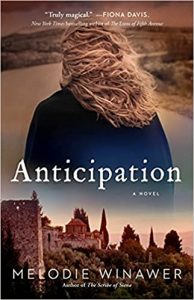Why I Wrote a Novel about Neurogenetics, Parenting, and the end of the Byzantine empire

Why I wrote a novel about neurogenetics, parenting, and the end of the Byzantine empire
In the summer of 2015, while seeing patients in the Neurological Institute of New York, I found myself with an unexpected break. As I walked down the hall outside my office, I ran into Michael Daras, a Greek-American neurologist whom I’ve worked with for 20 years. I was considering traveling with my family to Greece, and I asked Michael for advice. He drew a map of the three-fingered hand shape of the Peloponnese, and near the middle finger of that peninsula that extends south from Greece’s mainland, he wrote the word “Mystras.” He looked up from his sketch.
“What’s Mystras?” I asked.
“An abandoned medieval city.”
I had just completed the manuscript for my first novel, The Scribe of Siena, and I was itching to be writing another story. So when my colleague told me about an abandoned medieval city in the Peloponnese, the wheels started turning.
There are moments in a writer’s life when no words are going on the page; but writing is still happening. After that first encounter with the mysterious Mystras, what I’d learned crossed my mind intermittently, like clouds drifting by. While preparing for a neighborhood yard sale, things heated up again. We’d moved into our house in Brooklyn five years before, and the prior owners had left behind their book collection. In the chaos of our moving in with our twin two-year-olds and five-year old, we left the books in a top-floor storeroom and forgot about them.
Five years later, a few months after I’d first heard about Mystras from my colleague, I turned the knob of the antiquated light fixture in the storeroom to look for books to sell at the yard sale. Most were too interesting to give up (this is why I have so many books). One book caught my eye—tall spine, weathered brown binding, and an unfamiliar faded title: Castles of the Morea. I pulled the book from the shelf and started to leaf through the pages. The book fell open to a chapter titled “The Castle of Mystras.”OK, I said out loud, I hear you, whoever you are. I’ll write about Mystras. That would be a great end to this story, but it’s not the end.
I started my research with THE LOST CAPITAL OF BYZANTIUM by Stephen Runciman, an extraordinary work of scholarship, and an act of gratitude and love for the people of the modern town of Mystras at the base of the hill where the ruins of ancient Mystras still stand. I looked for facts to guide the story and help me understand how 800-year-old Mystras fit into the history of the crumbling Byzantine empire, the Turkish occupation, and the eventual hard-won independence of Greece. I also began to understand how my life taking care of people with neurological diseases and my research on neurogenetics would wind themselves into a narrative spanning centuries, with an illness that worsens in every generation– fueling a curse, a prophecy, and the dangerous search for a cure.
As I thought about the story, I started to sense a character whose life would be inextricably bound to Mystras over the years of its existence. I didn’t know who he was yet, but I could feel his presence, and I needed to know his name. One morning on my endless subway commute from Brooklyn to Washington Heights, I read through a list of Byzantine names—Leo, Michael, Demetrios–none quite right. Then I came to Elias. I liked the sound of it. Elias is Ilias in Greek; I liked that too. And it is the Greek name for Elijah, the Old Testament prophet. I let the name Elias sink in. On my even longer commute home at the end of the day, I went back to reading Runciman as usual. And then–it still gives me a chill remembering—on page 30, I read a passage about the hill on which Mystras would eventually be built:
The hill was uninhabited, but there was a little chapel on the summit, dedicated to the prophet Elijah, the patron saint of mountains…
Elijah—Ilias–Elias. Whatever force was moving me towards this story, I realized I’d better go with it.
My family did travel to Mystras, and the reality of the place was even more magical than I’d imagined. The winding stone streets, the looming walls and hilltop fortress, the domed churches painted with frescos, empty except for the nuns of the Pantanassa monastery, and a donkey tethered to a tree growing out of a ruined wall on the sunny hillside, all made me want to bring it back to life. The past is still with us—it’s not a dusty collection of facts, but a living breathing force. History teaches us who we are now; if we ignore it, we’re lost. And Greece’s current joy and tragedy are wrapped up in the history of the Byzantine empire. That’s why I wrote about Mystras.
As for why I intertwined a devastating genetic neurological disease, Byzantium, and the story of a mother and her young son, the long answer is the novel itself. But here’s the short version: In addition to being a historical novelist, I’m a neurologist and a neuroscientist. I can’t help thinking from all three of those parts of myself at once. I’m also a mom of three kids. Mothering is one of the greatest joys of my life, and it has also produced some of the most intense fear I’ve ever felt. All parts of me are in ANTICIPATION: doctor, scientist, lover of history, and mom. It seems like an impossible task to fit them all into one story, but the truth is, I couldn’t help it.
—
Category: On Writing


























Such an interesting story line. I love historical fiction and was intrigued by the background and history that arose out of your imagination.
Best wishes for success.